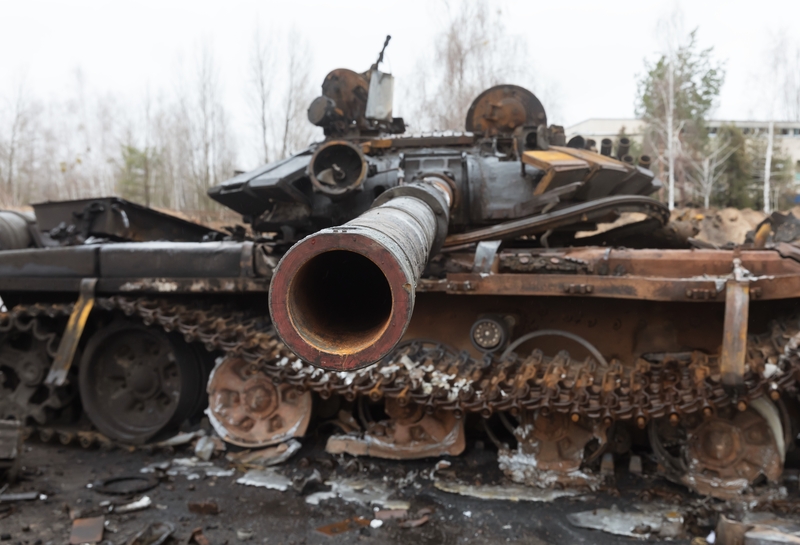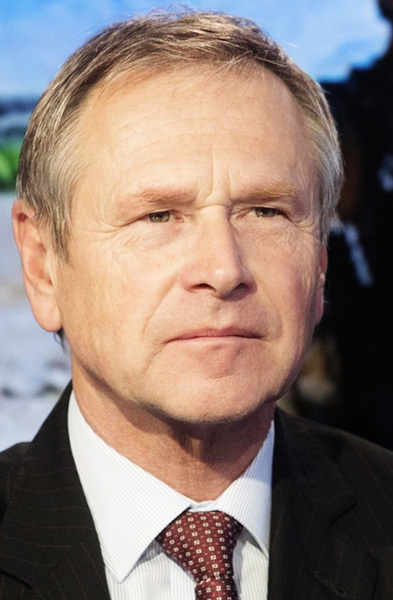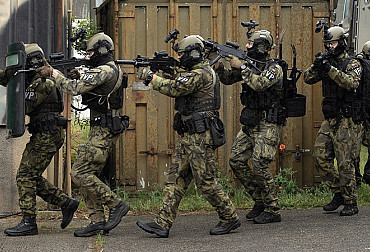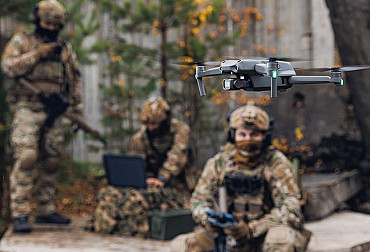Gen. Šedivý: From a strategic point of view, Russia has already lost
It is the second month of Russia's invasion of Ukraine and Putin still does not have victory in his hands, even though the aggressor's army is outnumbered in troops and materiel. But it lacks the most important thing that the soldiers of any army must necessarily have: the determination to fight and die in battle. Although much of the media, both last year and at the beginning of the Russian invasion in February, reported on the massive concentration of Russian troops around the perimeter of Ukraine, to assess whether there would be an attack from all directions, such a deployment of troops made no sense militarily. Therefore, many of us did not believe that Russia would commit to attacking Ukraine from positions that did not allow for effective concentration of forces in each direction.
 Picture: It's the second month of Russia's invasion of Ukraine and Putin still doesn't have victory in his hands, even though the aggressor's army is outnumbered in troops and materiel. But it lacks the most important thing that soldiers of any army must necessarily have: the determination to fight and die in battle. (Photo shows destroyed Russian equipment near Hostomel airfield near Kiev, 2 April 2022) | Shutterstock
Picture: It's the second month of Russia's invasion of Ukraine and Putin still doesn't have victory in his hands, even though the aggressor's army is outnumbered in troops and materiel. But it lacks the most important thing that soldiers of any army must necessarily have: the determination to fight and die in battle. (Photo shows destroyed Russian equipment near Hostomel airfield near Kiev, 2 April 2022) | Shutterstock
Speaking for myself, I did not believe that the Russian commanders were so ill-prepared that they would commit to such an attack. I was also mistaken in thinking that their position was so weak that they would not be able to force politicians to change their minds and abandon a military attack on Ukraine.
On 24 February, however, the Russian attack began. It was clear from the start that their troops were not advancing as planned. Although the Russians had been organising large-scale exercises for several years, in which they planned offensive operations, long-distance movements and logistical support for large military contingents, the current situation of the Russian troops shows that these were only staged exercises that were not linked to reality.
It is now evident that Russian commanders and staffs are not educated in the conduct of modern warfare, in the use of modern weapons and technology. As we know well from the past, even now Russian commanders and military experts are very likely to modify the conclusions of the analyses according to the wishes of their superiors. There is no other way to explain the fatal failure to assess the determination of the Ukrainian people to defend their territory, or even the determination of the part of Ukrainian society with a higher representation of the Russian minority. The Ukrainian army was certainly not in optimal condition before the invasion, but its capabilities were significantly underestimated. Above all, the moral state of the Ukrainian soldiers was underestimated.
Russia is still waging war according to Soviet rules
In 2017, I came into conflict with some generals and colonels of the socialist era. Advocacy of Soviet methods and army culture was coupled with attacks on Czech changes in army structure and training focus. Studying at a military college was just a "course" compared to a "quality education" at the Soviet/Russian Voroshilov Academy. The current conflict shows the real difference. While the Ukrainian commanders (though not all) have been educated in Western war colleges and general staff schools and, even with the limited forces of the Ukrainian army, are successfully fighting Russian troops, the Russian graduates of the Voroshilov Academy, after initial setbacks, have returned to "standard" warfare, i.e., what is still taught in the Voroshilov Academy: World War II-style warfare.
The superiority in the education of Ukrainian commanders is evident in the concept of comprehensive combat support for the Ukrainian army. It may not be able to completely prevent the loss of human life and equipment, but compared to the losses on the Russian side, these losses are a fraction. It is evident from the images and information from the battlefield that Russian commanders do not understand that it is not enough to concentrate a large number of formations on the direction of the operation, but they must also change their composition.
An example of this is the composition of the battle groups of the NATO forward military presence on the eastern flank, in which all necessary types of troops are represented alongside the all-army units to comprehensively defend and support the combat core. That the Russians do not understand this is demonstrated, among other things, by the fact that, even after the experience of Syria or Nagorno-Karabakh, they do not pay adequate attention to countering reconnaissance, but above all combat drones. Either they do not understand this or they do not have adequate resources. But the result is the same. Modern command systems are secured in communication by encryption, least of all by masking. The Russians use old, non-modern means of communication that can be easily eavesdropped on and also jammed. If it is true that the modern ones have been stolen, it only shows the state and morale of not only the Russian military, but also of Russian society, which in this respect is still deep in the socialist era.
Russia is unable to implement measures against satellite surveillance, not only against military satellites, but also against civilian imagery. Strategic camouflage on Russia's part does not actually exist. The focus on conducting radio-electronic warfare, or measures against the actions of Ukrainian forces, also appears to be insufficient. Modern command, control, reconnaissance, and surveillance systems coupled with precision-guided systems appear to be something that is beyond the capability of Russian forces to handle. Indeed, the large amount of old ammunition, which is far from accurate, together with the large number of failed bombs and missiles, indicates that not only old ammunition but also very unreliable ammunition is being used.
The absolute failure of the Russian commanders is the very low morale of the rank and file, probably even of the junior commanders. Sending basic service soldiers into battle without them having any information that they were going to war (they signed a contract before the actual operation) is reprehensible. But this is not the first time in the history of Russian wars. This has an impact on their morale, of course, but above all it leads to a large number of casualties of innocent soldiers who did not willingly choose such a fate.
The numerical superiority that the Russians can exercise may lead to the loss of some Ukrainian territory, even if the West finally commits to providing heavy military equipment. But this will be largely of an older date of manufacture, mostly unmodernised and therefore quite vulnerable. Light anti-tank or anti-aircraft weapons will only partially offset Russian numerical superiority.
Perhaps the Russians will succeed in capturing more of Ukraine's east and south. From the point of view of their capabilities, this seems likely, unless the whole Russian supply system collapses and Russian society is awakened and the crowds of Russians in the streets prevent further warfare.
Russia's incompetence in strategic camouflage and deception
Russia signalled changes to its plan to invade Ukraine when it withdrew troops from the Kiev direction, making it clear that it had given up on its ambition for regime change in Ukraine. We must pay all the more attention to eastern Ukraine - the Donetsk and Luhansk regions. Russia has announced their occupation as its next main objective. The link between Crimea and the separatist republics will be fought, even if it costs the lives of thousands more soldiers and civilians. The destruction of the Azov battalion in Mariupol can then be described as the fulfilment of the task of denazification. Mariupol is, in fact, a fundamental and key victory that Putin must achieve. Otherwise, the whole war would fall far short of its stated objectives. Mariupol is an important naval port and is a communication hub and a link between Crimea and the separatist republics, including Russia. Moreover, Mariupol resisted the 2014 war and must therefore be punished.
Maintaining the space between Kherson and Crimea is also important in terms of the functioning of the irrigation canal with water from the Dnieper on the route of Nova Kakhovka, Kalanchak and Armiansk in Crimea. Crimea is also dependent on this space for agriculture.
If Russia has the strength, it will continue to fight in the direction of Kherson and Odessa. But the announcement of meeting the objective by holding the entire eastern part from Kharkiv, through Mariupol to Kherson in the south will likely be what Putin will call a minimal success in Ukraine. He will then be left with separating Ukraine from the Black Sea and creating a corridor for a frozen conflict on the territory of Transnistria. It is now unclear whether such a task will be too big a bite for Russia. Moving troops from the east and mobilising reservists, which current intelligence reports suggest is already happening, may help. However, Russian commanders can only dream of strategically masking the activities of their armed forces: their current intentions are fairly well understood.
Russia will also have to justify a complete withdrawal of troops from Kiev, Chernihiv and Suma. Every war is also a war of information. It is highly probable that Russia will label its defeat in the north as the success of a deceptive operation to divert attention from the main lines and tie down the considerable forces of the Ukrainian army. Of course, Russia can claim that, but the failure is all too obvious. Just as the inexcusable brutality with which the Russians acted against the local population, whose bodies still lay in many places after the Russian retreat, is obvious. The shocking testimonies from Bucha or Borodjanka show the moral decadence of the Russian soldiers. At this point, however, it should also be noted that some Ukrainian soldiers are also committing war crimes, as evidenced by the leaked video of the murder of Russian soldiers.
The Russian attack seemed absurd to us
Many analysts and military leaders, including myself, were unable to correctly assess the situation before the invasion. Outside the US and UK, many of us did not believe that Putin would commit to an attack. It was so absurd that few believed it.
Our second sticking point was that we were completely ignorant of the real state of the Russian military: the depth of the corruption, clientelism and marasmus of the socialist establishment. The spectacular presentations of the best Russian equipment as a cry of technological superiority are shown in full nakedness as nothing more than marketing activities. The tank technology of the Russian invasion troops is a case in point. The admired T14 Armata tank was not seen on the battlefield and other Russian tanks in all their variants are often seen totally destroyed. The electronic protection systems of the Stora and Arena tanks, as presented by the Russians in the past, are not visible on the tanks.
On March 18, the only prototype of the modernized T-80UM2 tank, which was equipped with the Drozd 2 system, was probably destroyed. Corruption and waste of Russian national wealth has so exhausted Russia that even these weapons have not been introduced into the army. It is very likely that the same is true of the aviation equipment, which is not capable of defending itself against the air defence equipment supplied to Ukraine. The plundering of military assets is a standard that is publicly talked about, and it is nothing new. We know it from when the Russians were 'temporarily' in our country. Proven looting is part of the Russian military culture.
In the "war of the presidents", Putin is losing significantly. Unlike President Zelensky, he is not very visible in the media outside Russia outside of hate speeches. This is important because President Zelensky has brought almost the whole world to his side. It is evident that Russia has lost Ukraine not only today, but also for the distant future. And even if it controls part of the territory, the Ukrainians will not agree that the occupied territory is Russian territory. In addition, Russia has lost international credit, which Putin will not be able to restore even if he is in power for another 20 years. Whatever the outcome of the war on the battlefield, Russia has already lost from a strategic point of view.

Picture: Gen. Jiří Šedivý (v.v.) | Jiří Šedivý archive
Gen. Ing. Jiří Šedivý
Former Chief of the General Staff of the Czech Armed Forces, head of the Department of Security Studies and guarantor of the MPA - Security and Crisis Management programme at the CEVRO Institute. He is a member of the Czech Euro-Atlantic Council and specializes in security, crisis management, reform of the Czech Armed Forces, protection of the critical infrastructure of the state, energy security and other related areas.





















